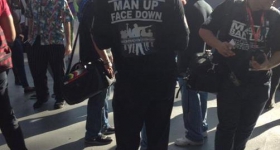Early on in Wesley Yang’s searing collection of essays, The Souls of Yellow Folk, in a profile piece about chef, TV personality and all-around badass Eddie Huang, the writer tackles the onus of representation head-on: “A model minority is a tractable, one-dimensional simulacrum of a person, stripped of complexity, nuance, danger and sexuality — a person devoid of dramatic interest.”
It’s an apt description for the sort of cartoonish stereotype that Yang is pushing back against with his collection, though it is important to note that the way he combats these misrepresentations isn’t with blunt force; rather, his tactics are a lot more meticulous, studied and layered. And, importantly, self-reflective. The 13 essays bound together in this collection were published between 2008 and 2017, representing nearly a decade’s worth of observation and introspection that, added together, helps to undercut any assumption people might have about a monolithic Asian American identity.
“Though I am an immigrant, I have never wanted to strive like one,” he writes in his viral 2011 New York Magazine essay, “Paper Tigers.” It’s this sort of bold proclamation that the reader comes to recognize as uniquely Yang — he has the ability to both acknowledge the tropes that Asian Americans are burdened with and the necessary unpacking that has to take place in order to find a way forward. Yang doesn’t write for provocation’s sake, though many of his critics and fans may label him a provocateur; he writes to interrogate the uncomfortable, liminal space that Asian Americans occupy.
In examining this values divide, Yang is successful at unearthing some rather awkward-but-salient revelations: that Asian Americans can feel indignant about being lumped with other Asian Americans, but still find commonalities to be "both true and unspeakable”; that the big chip on many Asian American men’s shoulders come from believing they’re not worthy of love; and that the values that America supposedly stands for — the American Dream and an equal opportunity for all — are now demonstrably false, among other things. These truths get at the heart of something even more tellingly human about Yang’s essays: he is always looking to understand how people connect and fail to connect, and what circumstances give rise to the disconnection.
This leads to another important point to make about The Souls of Yellow Folk — though the title of the book boasts a series of bold takes on race, not every essay is explicitly about race. Rather, an arguable majority of the essays are more interested in America as a construct and how marginalized subsects of already marginalized communities are able to exist within it (this includes, of course, ethnic minorities). The aforementioned “Paper Tigers” and profile on Eddie Huang (“Eddie Huang Against the World”) do address the problematics of the model minority myth and the consequences of its long-cast shadow, but other equally powerful essays in the collection are more concerned with how disconnection and yearning drive individuals to do unexpected, and sometimes unthinkable, things.
Several of his pieces (“The Face of Seung-Hui Cho,” “The Life and Afterlife of Aaron Swartz,” “The Liveliest Mind in New York,” “The Terrorist Search Engine” and “On Francis Fukuyama”) also, interestingly, all deal with men who have built their legacies upon their outsider status. The audacity to go against the grain, in these instances, have been rewarded with notoriety, a fact that Yang acknowledges with wariness and intrigue.
“All in all, he is one of the most admired and denounced thinkers living in New York City,” he writes of Tony Judt, a revered public intellectual whose body has suffered the effects of Lou Gehrig’s disease. (Of Aaron Swartz, the hack-tivist who co-founded Reddit, Yang writes: “Like many young men of great promise and fluctuating moods, Swartz was an unstable compound of self-effacement and self-regard — among the most empowered, well-connected young people in America, yet convinced that his very existence was a burden to others, even those who loved him.”
The emphasis on connectivity here is no accident; through Yang’s lenses, finding connection is the undercurrent of all his subjects’actions and desires, be it through dating (the hilariously clear-eyed “On Reading the Sex Diaries”), pop culture (“Inside the Box”) or activism (“We Out Here”). His interest in marginalized individuals and communities can be understood as an investigation into the roots of an underdog and a respectful homage to the loneliness and longing that characterizes much of today’s America.
His last two essays of the collection, “Is It OK to Be White?” and “What Is White Supremacy?” go one step further, examining the shifting power dynamics that have resulted from society’s changing attitudes about race, with white people suddenly starting to feel marginalized and antagonized for their whiteness. It’s an interesting way to come full circle with Yang’s observations, in that the new “one-dimensional simulacrum” of this decade is the white man, seeking connection and arguing for a chance at nuanced representation.
To this, Yang responds with a warning to us all, yellow folk and otherwise: “Now would be a good time to be careful with the meanings of words, aware of their multiple connotations, the uses to which they are being put, the ways they appear to different groups of people.” A powerful sentiment, given how precarious this balance of patience and complacency can be. Whereas one might assume that Yang would happily find cathartic release by blasting the very white men who previously forced him into the unwilling role of the model minority, he instead offers compassion and sage advice. And perhaps, in the end, this is the biggest takeaway from Yang’s work: all humans desire, above all else, connectivity and will go to great lengths to find and protect their right to be seen, heard and understood.










Comments